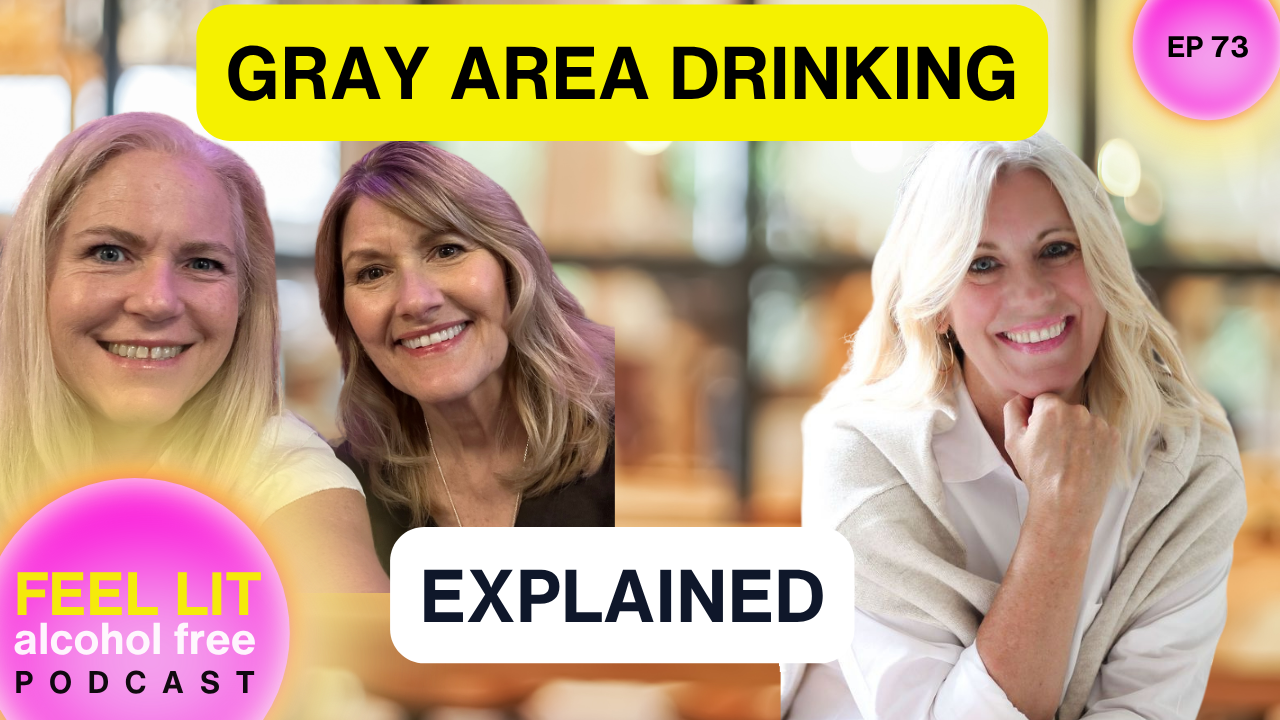Ep. 73 Are You a Gray Area Drinker? Jolene Park Breaks It Down
Jun 03, 2025
Listen to the PODCAST Here
Watch the Podcast on YouTube Here

Navigating the “Gray Area” of Drinking: How Jolene Park’s Nourish Method Offers Hope and Healing
In this episode of the Feel It Alcohol Free Podcast, Jolene Park joins coaches Ruby Williams and Susan Larkin to unpack the meaning of "gray area drinking" and to share practical strategies for creating lasting change, including her transformative Nourish Method.
Understanding Gray Area Drinking
When people picture unhealthy relationships with alcohol, they often imagine extremes: either the rare social drinker or the person struggling with severe dependency. Jolene Park, a leading voice in the sober movement and creator of the Nourish Method, says most drinkers fall somewhere in between. This space—what she famously calls “gray area drinking”—captures the millions who don’t fit neatly into either bucket.
Gray area drinking, Park explains, is the spectrum between “every now and again” drinking (two or fewer drinks per week) and the “end stage” drinking that requires medical intervention. It includes anyone who drinks more than occasionally, who may struggle with moderation, or who questions the role alcohol plays in their lives. Crucially, gray area drinkers can often stop for periods—think Dry January or taking breaks—but often return to drinking, feeling inner conflict, shame, and confusion about whether they “really have a problem.”
This ambiguity, Park argues, makes it easier to downplay concerns and harder to seek help. The term “gray area drinking” offers a non-stigmatizing language for those who don’t resonate with labels like alcoholic, yet who know deep down that their drinking isn’t serving them.
Shifting the Focus: It’s About How You Feel
A recurring theme in Park’s work and her conversation with Susan and Ruby is that most people drink to change how they feel. Whether it’s winding down after work, easing social anxiety, or simply wanting to feel “better,” alcohol becomes an easy—though ultimately ineffective—tool. The irony, as Park notes, is that alcohol’s calming effect is both temporary and deceptive; over time, it ramps up stress hormones like cortisol, leaving us feeling more anxious than before.
The pivotal question for those in the gray area isn’t “Am I an alcoholic?” but rather, “Is alcohol truly helping me feel the way I want to feel?” Park encourages listeners to ask themselves: How do I really want to feel in my life? What am I hoping alcohol can do for me—and is it delivering?
Introducing the Nourish Method
Recognizing the physiological and emotional drivers of drinking, Park developed the Nourish Method, a framework to replenish, rewire, and repair the nervous system after quitting or reducing alcohol. At its core, the Nourish Method is about adding in positive resources instead of focusing on deprivation.
Each letter in “NOURISH” stands for a modality or practice that supports well-being:
- N: Notice Nature
- O: Observe Your Breath
- U: Unite with Others
- R: Replenish with Food
- I: Initiate Movement
- S: Sit in Stillness
- H: Harness Your Creativity
Park emphasizes that these are not prescriptive “shoulds,” but a toolkit to experiment with. She invites individuals to become curious about what nourishes them and to pay attention to what actually changes their state, in the same way alcohol once did.
Practical Tips and Personalized Support
Walking through the Nourish Method, the podcast touches on concrete examples:
- Morning sunlight and earthing (putting feet on the ground) can measurably reduce stress and inflammation, supporting circadian rhythms and mood.
- Breathwork like the “vu breath” tones the vagus nerve, quickly calming anxiety.
- Community is key—not just in sober circles, but any meaningful in-person engagement.
- Protein-rich foods stabilize blood sugar, reducing cravings in moments when drinking would otherwise seem appealing.
- Gentle movement (especially walking), creative activities, and periods of stillness all help re-regulate a nervous system used to relying on alcohol.
Importantly, Park highlights that what works for one person may shift over time; the goal is to discover what brings genuine relief and pleasure, without reaching for the bottle or the “bakery.”
Conclusion: Add In, Don’t Deprive
What makes the Nourish Method so liberating is its invitation to add in—not just remove. For those in the gray area, healing is about building a repertoire of self-care skills that are genuinely satisfying and nurturing. As Park and the podcast hosts emphasize, this process is empowering: it’s not about being told what to do, but about reclaiming your right to feel good in your own body, on your own terms.
_____
Listeners have said that our podcast has helped them get alcohol free! So we created Feel Lit 21, a way for you to press your reset button and take a 21 day break from alcohol. Every day you will receive emails with videos, journal prompts, and the inspiration you need to embrace 21 days without alcohol that feels lit!
https://feellitpodcast.com/FeelLit21-sg
Find community and connection on the Feel Lit Alcohol Free Facebook Page: https://www.facebook.com/groups/feellitalcoholfreepodcast
Ruby Williams at Freedom Renegade Coaching https://www.freedomrenegadecoaching.com/
Follow Coach Ruby: @rubywilliamscoaching
Email: [email protected]
